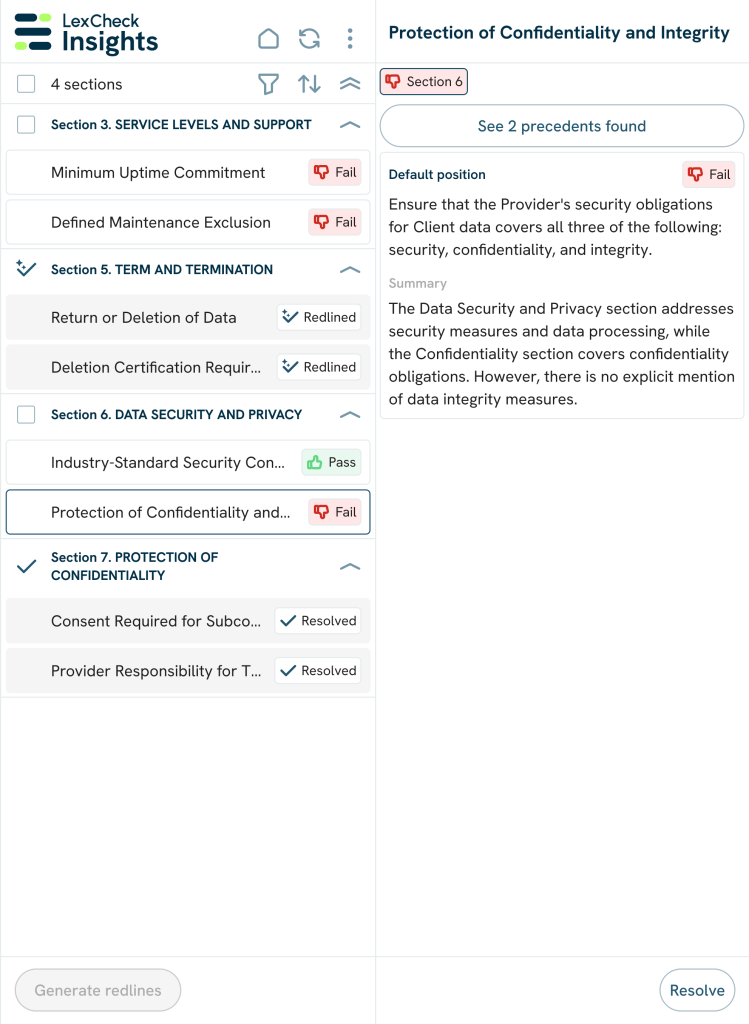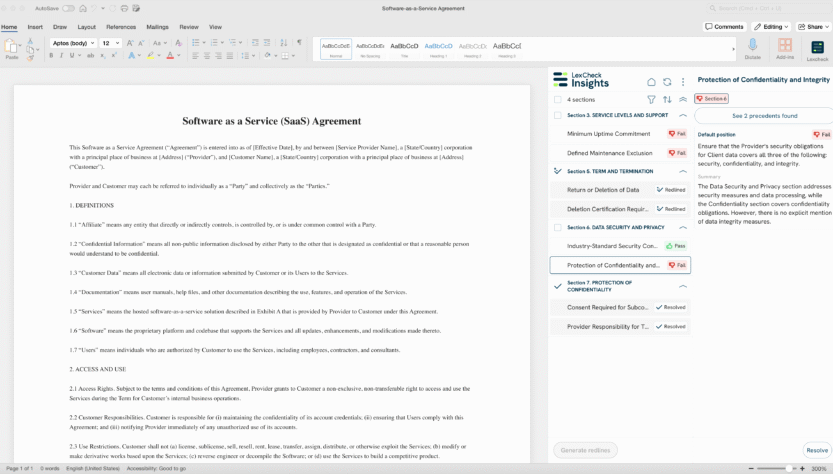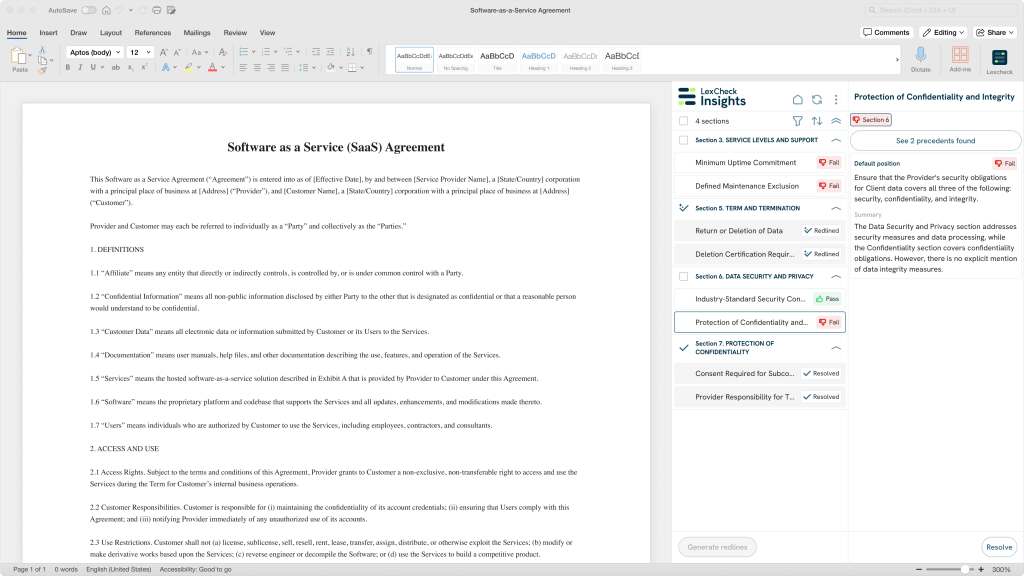LexCheck has launched version 3.0 of its AI-powered contract review software, introducing capabilities that automatically generate custom playbooks from clients’ historical redlines and provide precedent checking against past agreements.
The New York-based legal technology company says the release is a significant advancement in contract review accuracy and enterprise scalability.
This follows its January release of its version 2.0, called Insights, which was its first to incorporate large language models on top of the natural language processing it had employed since its launch in 2015.
The new version builds upon LexCheck’s existing contract review foundation, which identifies deviations between client template language and counterparty documents. Version 3.0 adds automated playbook generation, precedent analysis, and enhanced redlining capabilities designed to handle complex commercial agreements including MSAs, SaaS agreements, and professional service agreements.
Learn more about LexCheck in the LawNext Legal Technology Directory.
A key feature of LexCheck 3.0 is its ability to create review guidelines by analyzing clients’ past redlined contracts. Rather than requiring legal teams to manually develop playbooks from scratch, the system extracts patterns from historical redlines to generate initial drafts of review standards.
“We understand that playbooking is very important and it can be a laborious process for a lot of our clients,” Daniel Moon, head of product at LexCheck, told me during a demonstration last week. The company’s approach involves uploading client redlines to its platform, where software generates a first draft playbook that captures approximately 60-70% of client preferences, according to Moon.
LexCheck’s internal team then refines these automatically generated playbooks. The company reports this hybrid approach reduces implementation time while leveraging both software analysis and human expertise. The goal, Moon said, is to progressively shift the ratio toward greater automation, eventually requiring human reviewers primarily for error checking.
The number of redlined documents needed to generate a playbook varies by document type and complexity. Moon suggested that repetitive document types might require five to six examples, while complex agreements with numerous edge cases could need 20 to 30 redlined contracts for effective pattern recognition.
The training is done using first-pass redlines, which LexCheck views as most representative of standard client positions when initially reviewing third-party documents. The company plans eventually to expand capabilities to extract fallback positions by analyzing executed agreements and multiple negotiation rounds.
Precedent Checking Against Previous Agreements
Version 3.0 introduces a precedent checker that searches uploaded historical agreements when contract provisions fail to meet playbook standards. This feature addresses situations where legal teams need to determine whether similar terms have been accepted previously under specific circumstances.
The precedent checker operates through a conversational interface, allowing users to refine searches by document type, counterparty, date ranges, and other parameters. Users can ask follow-up questions about identified precedents, such as to request examples from specific time periods or that involve particular counterparties.
“I’ve heard too many times of those stories where a partner walks into an associate’s office and says, ‘Hey, wasn’t there a deal that we did 10 years ago? I think it was Delaware. I think it was about a bakery,’” Moon explained. “This solves for that, and it makes it very intuitive for people to look at those precedents.”
Currently, the precedent checking function requires clients to upload their historical agreements to LexCheck’s system. The company indicated that document management system integration is planned for future releases, though initial implementations will rely on bulk document uploads.
Three Levels of Review
LexCheck 3.0 maintains the comprehensive review functionality of earlier versions while adding new layers of analysis. The system continues to identify deviations between client templates and counterparty documents, but now provides three levels of review: playbook-based analysis for standard positions, comprehensive deviation detection through the existing Insights tool, and precedent checking for context.
 The interface presents review results with filtering options for passed, failed, and resolved items. Each identified issue includes reasoning for why provisions passed or failed playbook standards, along with suggestions for redlines.
The interface presents review results with filtering options for passed, failed, and resolved items. Each identified issue includes reasoning for why provisions passed or failed playbook standards, along with suggestions for redlines.
Moon said this multi-layered approach to contract review addresses legal teams’ concerns about both false positives and missed issues in automated contract review. “Customers obviously care about the 80% that it gets right, but they’re equally concerned about the 20% that it gets wrong.”
Integration and Workflow
The software operates within Microsoft Word, requiring no changes to existing workflows. Users can generate redlines directly within their document review process, with the system providing surgical markup based on identified issues.
LexCheck 3.0 supports different playbook configurations for various scenarios. Legal teams can create separate playbooks for different industries, counterparty sizes, or deal types, allowing for customized review standards based on specific circumstances.
The precedent checker integrates with the review process, automatically running when provisions fail playbook standards and providing immediate access to relevant historical precedents without interrupting the review workflow.
‘Significant Leap Forward’
Gary Sangha, LexCheck’s CEO, described version 3.0 as representing “a significant leap forward in redline accuracy, ease-of-use, and enterprise-grade scalability” following the company’s January Insights release.
The company differentiates itself from other AI contract review tools by emphasizing its ability to learn from past negotiations and adapt to organization-wide preferences across various contract types. LexCheck targets both routine agreements and high-complexity contracts that require detailed analysis.
LexCheck 3.0 is designed to scale across teams and workflows, whether reviewing individual contracts or processing thousands of agreements. The software maintains its focus on delivering guidance directly within existing document review processes.
Sangha founded LexCheck in 2015, originally under the name LitIQ. The lawyer and serial entrepreneur had previously founded Intelligize, a securities compliance platform that was acquired by LexisNexis in 2016. Prior to Intelligize, Sangha practiced securities law at Shearman & Sterling and White & Case.


